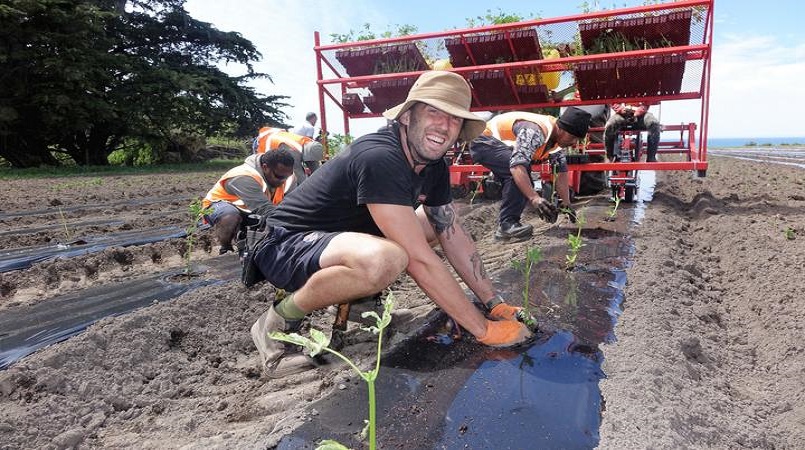
Sun, sea and soil: these are the key ingredients for growing New Zealand's largest-ever medical cannabis crop.
The first seedlings are now in the ground along the salt-laden and sunny slopes of Kēkerengū - just north of Kaikōura.
The ocean-side plantation run by research and development and cultivation company Puro will eventually cover the equivalent of 10 rugby fields.
Fresh out of quarantine, US-based cultivation technician Max Jablonski was last Friday focused on planting the prized seedlings into freshly furrowed, chocolate coloured soil.
The seedlings were sprouted in a Blenheim nursery, from 140,000 specially selected seeds from around the world. And costing between $1 and $5 each, they were carefully and individually embedded by hand.
Puro managing director Tim Aldridge said it was an important day seeing them transplanted into their new oceanside home.
"It's an exciting day. We've been [through] two-and-a-half years of very hard work to get to this point and it's so exciting to have our crop now underway at the outdoor facility on the Kaikōura coast."
Puro was set up in 2018 to guide the development of the plantation on the Macfarlane family farm in Kēkerengū. The site and the seeds were chosen by Puro's Melbourne based cultivation director Tom Forrest.
He said Kēkerengū was on the exact latitude south to its northern counterpart in California's green triangle.
"It's almost exactly opposite to Humboldt County in terms of latitude and distance from the equator. That's something I find quite fascinating."
Forrest said it was a "sweet spot" for reasons similar to why Marlborough produced world-class sauvignon blanc, and why hops flourished in Nelson - it's all in the latitude.
"It's said that cannabis split from the hops plant possibly tens of millions of years ago.
"People will say anywhere in the world cannabis can grow like a weed, but it's that sweet spot where we'll be able to grow without needing major changes to our environment.
"It's a nice middle ground - the day length, the sunlight intensity - all of these factors combine to make that 42 degrees [south] what seems to be the perfect latitude for healthy, vigorous cannabis cultivation."
It was also a beautiful part of the country, Forrest said.
"Looking at the location: the rising point above the sea level, the ocean breezes and the micro-climate, coupled with the UV and the air quality makes it a really perfect melting pot for high potency, high quality, incredibly unique medical cannabis cultivation."
The site's proximity to salt spray drifting up off Kaikōura's thumping surf was also a factor in the company's aim to become a certified organic producer.
"The salt spray off the ocean can have beneficial properties, particularly when it comes to the leaf surface and what sort of microbes and bacteria exist.
"It can almost act as a 'cleaning breeze'."
Aldridge said they were growing under organic protocols. It was chemical-free agriculture, meaning no pesticides were used but the operation was yet to be certified organic.
"That's a process we're underway with."
